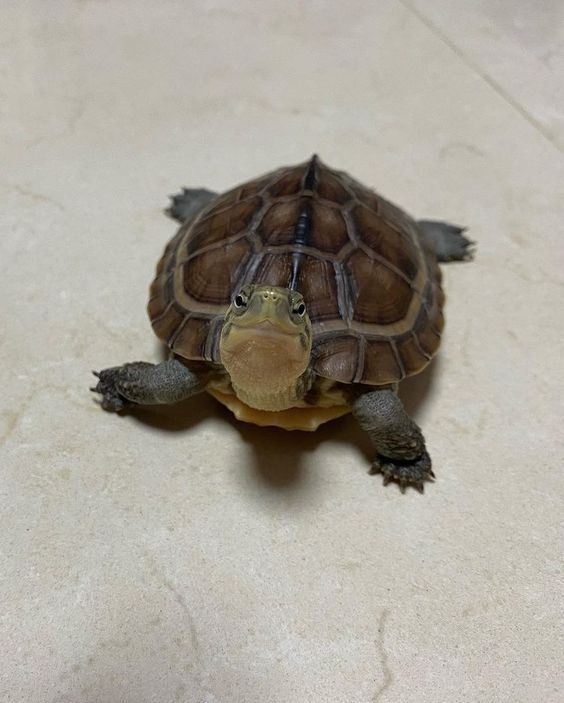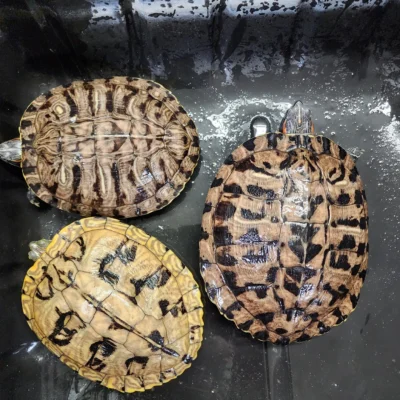Buy a baby Box Turtle online.
Baby Box Turtles—also known as hatchlings—are miniature versions of their adult counterparts, but with softer shells, higher protein needs, and more vulnerability to dehydration and stress. Whether you’re raising them, listing them, or educating your audience, here’s a full breakdown tailored to your level:
Buy a baby Box Turtle online
🐢 Hatchling Profile: Baby Box Turtles
| Attribute | Details |
|---|---|
| Size | ~1–2 inches (2.5–5 cm) shell length at hatching |
| Weight | ~2–4 grams |
| Shell Texture | Soft and pliable at birth; hardens over weeks |
| Lifespan | 30–50 years with proper care |
| Sexual Maturity | ~5–7 years depending on species |
They’re born with a hinged plastron, allowing full shell closure even at a young age—a key defense trait of the Terrapene genus.
🧬 Species Highlights
- Eastern Box Turtle (Terrapene carolina carolina)**
- Shell: Brown with orange/yellow blotches
- Skin: Olive with speckling
- Behavior: Shy, forest-adapted
- Ornate Box Turtle (T. ornata ornata)**
- Shell: Dark with yellow radiating lines
- Behavior: More active and heat-tolerant
- Florida Box Turtle (T. baurii)**
- Shell: High yellow contrast; semi-aquatic tendencies
- Popular in the pet trade for vivid coloration
🏡 Hatchling Setup
- Enclosure Size:
- Indoors: 60 × 40 cm minimum
- Outdoors: Secure pen with shaded microclimate
- Substrate:
- Coconut coir, sphagnum moss, organic topsoil
- Depth: 5–8 cm for burrowing
- Temps & Humidity:
- Day: 80–85°F (27–29°C)
- Night: 70–75°F (21–24°C)
- Humidity: 70–90% to prevent dehydration
- Lighting: UVB is essential for shell and bone development
- Water Dish: Shallow, easy-access soaking bowl
Baby box turtles are terrestrial, not aquatic—they soak, not swim.
🍽️ Diet & Feeding
- Feeding Frequency: 2x/day for hatchlings
- Diet Composition:
- 70% protein: Earthworms, crickets, mealworms, boiled egg
- 30% plant matter: Dandelion greens, squash, berries
- Supplements: Calcium + D3 powder 3x/week
Avoid dry pellets or leafy greens alone—high protein is critical for early growth.
🧠 Behavior & Temperament
- Shy but curious: Will explore once acclimated
- Sensitive to handling: Best observed, not touched
- Burrowing instinct: Provide leaf litter and moss piles
They thrive in naturalistic setups with cover, humidity, and routine.






Alyson (verified owner) –
Vita (verified owner) –
For me this is by far the best reptile shop in the area. I have brought reptiles from here and food on a regular basis. The staff are very knowledgeable in their animals and equipment. The welfare of their animals while at the shop and when going to their new homes is of upmost importance to them, to ensure they have a happy and healthy life.
Maya (verified owner) –
Will definitely use exotic animalls to purchase more toads when they are in
Noe (verified owner) –
It’s far better than other pet shops, while the price is still acceptable.
Tavares (verified owner) –
Good response from the support.
Ara (verified owner) –
I received a personalized and attentive treatment. Thanks to this deal, I was able to find a solution to my problem in a short time. 🙂
Kyle (verified owner) –
I got excellent support for this item. They were patient with me, and helped me solve my issue. I recommend this company 100%
Alanis (verified owner) –
Think everyone should know about this, it’s just beyond my expectations
Jessika (verified owner) –
The first time I got the urges to leave a comment, but this is simply a top-notch thing you can find.
Mable (verified owner) –
Been using a lot of items, this one is obviously the best
Izabella (verified owner) –
I’m caught 🙂 Find my love and will never buy in any other shop.
Dandre (verified owner) –
This is the coolest thing I’ve found on here! Will keep using your products in the future!
Corrine (verified owner) –
I think this is amazing. Lots of features and customizable from every point of view. The few times I asked for help in support they were competent, fast and above all very patient. Really recommend
Lindsey (verified owner) –
An awesome product with great flexibility. The customer support is superb. I recommend this without any doubt.
Clemens (verified owner) –
I have made many purchases from Exotic animalls, the first being an aquatic sharp ribbed newt. They gave me excellent advice about habitat, temperature and food etc. Following their advice my newt, and 4 others I purchased, are thriving. I have also bought live food for my tree frogs and decorations for their vivarium. You can phone or email Exotic Animals and they will always offer great, and knowledgeable advice.
Cale (verified owner) –
Absolutely impressed with our baby bci, he came well packaged and protected, has clearly been well cared for and handled appropriately, and the service, communications and delivery were excellent, will definitely be using exotic pets as our new supplier of all things reptile.